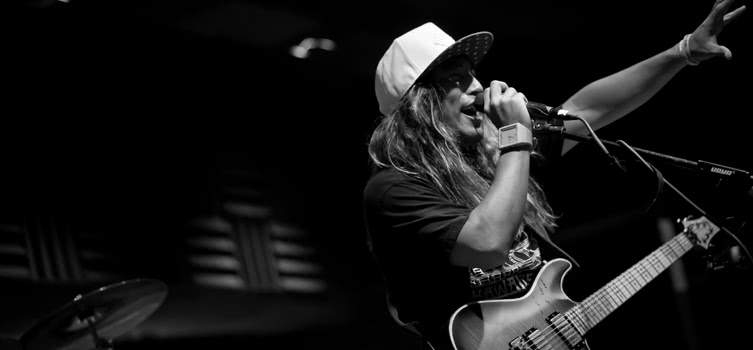Hawaiian local Jordan T is little known to Australian audiences. To be frank, he’s not massively known anywhere, but the relaxed solo performer (whose full name is Jordan Tolentino) has made an impression on New Zealand reggae titans Katchafire.
Following an extensive US tour together, Tolentino follows Katchafire down to Australia this week. It’s the grinning Hawaiian’s debut Australian appearance and he’s delighted to finally make it out here.
“I’m really, really excited because it’s always been on one of those bucket lists for my life,” he says. “Travelling is always exciting for me, so if I can mix it with my job and have music and travel and see people, new cultures, experience new things – then I think we’re winning!”
Tour headliners Katchafire are proudly indebted to the heyday of Jamaican reggae music. The band’s name comes from a Bob Marley song, which betrays their origins as a Tuff Gong tribute act. Even though the seven-piece has spent the last decade amassing enough originals for a ‘Best Of’, reggae remains Katchafire’s weapon of choice. Many of Tolentino’s compositions also possess a reggae flavour, but he hasn’t pledged allegiance to the genre.
“In my musical journey, it’s been really good to experience all kinds of different styles,” he says. “I studied opera for four years and then I did some jazz and I played in a hardcore metal band before. I may not use all those techniques all the time, but at least I have those in my tool belt.”
The applicability of genre labels is an ongoing point of debate. Granted, abstract terms can’t properly account for the nuances of musical expression, but it’s fair to say that disparate styles are rarely combined convincingly. Making boundary-less music is a respectable ambition, but it takes a little more than basic ambition to integrate diverse sounds.
“I really try to mix my palate,” Tolentino says. “I grew up listening to Motown and Stevie Ray Vaughan. I don’t like just one style. I like to listen to metal sometimes, depending on the mood. I like to listen to some island reggae, I like to listen to some classical sometimes. I learn from them, I learn techniques and I learn phrasings and cool little things that I can apply to my music. I listen with an active ear.”
While Tolentino is equipped with multiple stylistic tools, there are always going to be areas of expression that are out of reach. He has no delusions in this respect.
“We’re dealing with music and emotion and trying to interpret what we are feeling and putting it out there,” he says. “Whenever I write music, I never try to force it. I always make sure that the key behind the writing is that it’s real. It’s not something that I’m making up. It’s something that I’ve felt in my life at some time.
“I want to be as real as I possibly can. It’s a funny industry and there’s a lot of fake people out there. I just want to bring a realness to the music that’s authentic.”
Tolentino’s pursuit to project intimate honesty doesn’t mean his creations are impenetrably insular. Onstage, he seeks to involve everyone in a continuous exchange.
“When I sing it and I believe in what I’m singing, then the audience will believe it too, ” he says. “Sometimes there’s a barrier where people don’t interact, but I want to make everybody feel like we’re all in the same exact moment together, so we experience the music together.”
Supporting Katchafire at The Hi-Fi Friday November 7 (tickets here) and the Cambridge Hotel, Newcastle Sunday November 23 (tickets here).

































